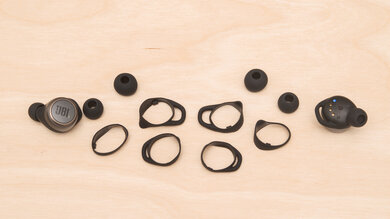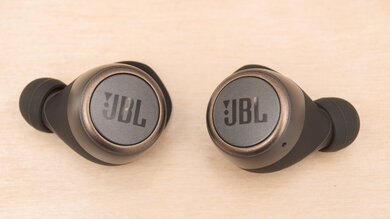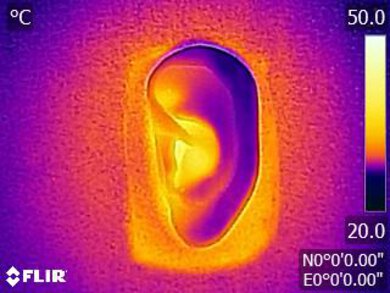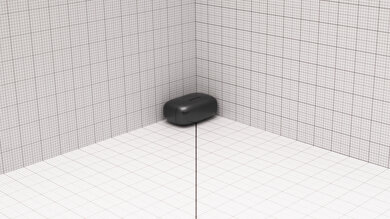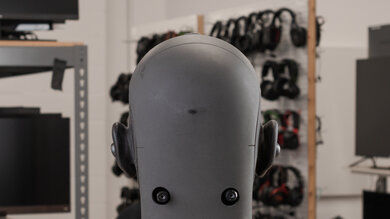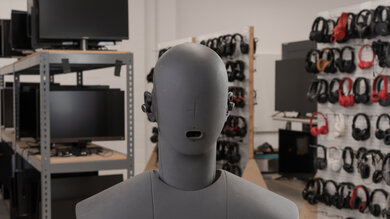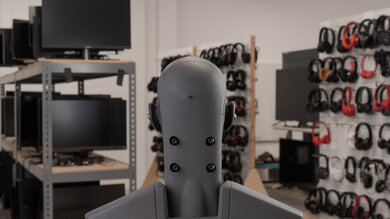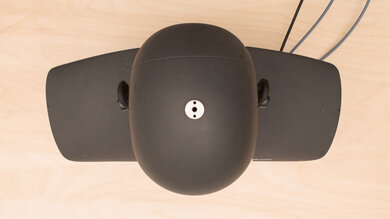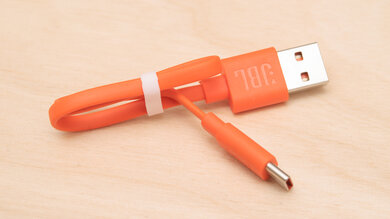The JBL LIVE 300TWS are a fairly straight-forward pair of truly wireless in-ears that perform decently overall for most uses. Their small earbuds make them quite comfortable for in-ears, and even after long listening sessions, they don't cause too much fatigue or discomfort. Their sound profile is fairly well-balanced, making them suitable for a wide range of genres, and their great companion app gives you a ton of customization options, including a parametric EQ and presets. With their stability fins attached, they're stable enough to wear at the gym or during your morning jog, and they're certified IPX5 for water resistance. Unfortunately, their 4.4-hour battery life isn't great and is quite a bit shorter than the six hours advertised by JBL. Overall, if you're looking for a new pair of truly wireless in-ears, they're a decent choice, but they don't stand out much from the crowd.
Our Verdict
The JBL LIVE 300TWS are decent for neutral sound listening. Their out-of-the-box sound profile is quite well-balanced and accurate, though they have a fair amount of extra bass. That being said, their great companion app gives you access to a fully parametric EQ and presets, so you can customize the way they sound. Like with most closed-back in-ears, they don't have a wide or open soundstage, and music sounds like it's inside your head as opposed to in front.
-
Comfortable for in-ear headphones.
-
Stable design suitable for sports.
-
Versatile and well-balanced sound profile.
-
Great companion app with lots of customization options and parametric EQ.
-
Less than advertised battery life.
-
Decent-at-best noise isolation.
The JBL LIVE 300TWS are good in-ears for commuting and travel. While they're comfortable enough to wear during long flights or bus rides, unfortunately, they do a terrible job of blocking out the noise from bus or plane engines. That being said, they do an excellent job of blocking out background chatter, which can be helpful in case the stranger next to you on a flight wants to become friends. Unfortunately, their 4.4-hour battery life likely isn't very long, so you may have to toss them in their charging case to get you through a long flight.
-
Comfortable for in-ear headphones.
-
Stable design suitable for sports.
-
Versatile and well-balanced sound profile.
-
Great companion app with lots of customization options and parametric EQ.
-
Less than advertised battery life.
-
Decent-at-best noise isolation.
The JBL LIVE 300TWS are great headphones for sports. They feel very stable with their stability fins attached, and won't fall out or slide even during intense workouts. They have a bit of extra bass to help keep you pumped up at the gym, and they're comfortable enough to wear during your long weekend runs. Their controls are easy to use, so you don't have to worry about taking your phone out mid-jog, and they feel durable enough in case they accidentally get dropped. they're also certified IPX5 for resistance against direct water contact. Unfortunately, their battery life is a bit disappointing at around 4.5 hours, though that should still be long enough for most workouts, and you can easily charge them by tossing them back into their case.
-
Comfortable for in-ear headphones.
-
Stable design suitable for sports.
-
Versatile and well-balanced sound profile.
-
Great companion app with lots of customization options and parametric EQ.
-
Less than advertised battery life.
-
Decent-at-best noise isolation.
The JBL LIVE 300TWS are okay headphones for office use. While they're comfortable enough to wear for long periods, unfortunately, they only last 4.4 hours off a single charge, so you'll likely have to take a break and toss them in their case to last a full work day. They also do a bad job at blocking out low-frequency sounds, which can be an issue if there's construction happening at your office. On the bright side, they do an excellent job at blocking out other office sounds, like chatty coworkers or A/C units, and they leak almost no audio, so you can turn up your music without bothering the person at the desk next to you.
-
Comfortable for in-ear headphones.
-
Stable design suitable for sports.
-
Versatile and well-balanced sound profile.
-
Great companion app with lots of customization options and parametric EQ.
-
Less than advertised battery life.
-
Decent-at-best noise isolation.
The JBL LIVE 300TWS aren't suitable headphones for wireless gaming. These truly wireless in-ears are Bluetooth-only, so they aren't compatible with Xbox One or PS4. While you can pair them to your phone or Bluetooth-enabled PC, their high latency and mediocre microphone performance make them less than ideal for any competitive gaming.
The JBL LIVE 300TWS are Bluetooth-only headphones that can't be used wired.
The JBL LIVE 300TWS are okay headphones for phone calls. They have an integrated mic in the headphones, allowing you to easily answer a call while on-the-go. Their mic works surprisingly well for Bluetooth headphones, and while your voice sounds thin, it's clear, natural, and distortion-free. The mic's noise handling is sub-par though, and your voice gets drowned out in loud environments.
-
Comfortable for in-ear headphones.
-
Stable design suitable for sports.
-
Versatile and well-balanced sound profile.
-
Great companion app with lots of customization options and parametric EQ.
-
Less than advertised battery life.
-
Decent-at-best noise isolation.
- 7.3 Neutral Sound
- 7.5 Commute/Travel
- 8.3 Sports/Fitness
- 7.1 Office
- 5.9 Wireless Gaming
- 5.8 Wired Gaming
- 6.6 Phone Calls
- Updated May 13, 2022: We mistakenly reported that these headphones didn't have an IP rating. We have corrected our results and updated our review.
- Updated Apr 12, 2022: When updating these headphones to the latest test bench, we noticed that our unit's charging case wasn't charging the buds. Unfortunately, we don't know what caused this issue, and it doesn't seem to be reported by other users. That said, we have purchased and received a new unit, which matches the performance of the original pair. We've added a picture of the new model's label to 'Differences Between Variants'.
- Updated Nov 26, 2021: Converted to Test Bench 1.5.
- Updated Jun 02, 2020: Review published.
- Updated May 29, 2020: Early access published.
- Updated May 21, 2020: Our testers have started testing this product.
- Updated May 20, 2020: The product has arrived in our lab, and our testers will start evaluating it soon.
- Updated May 16, 2020: We've purchased the product and are waiting for it to arrive in our lab.
Differences Between Sizes And Variants
The JBL LIVE 300TWS come in four color variations: 'Black', 'Blue', 'Purple', and 'White'. We tested the 'Black' variant, and you can see our model's label here. Keep in mind that this label comes from our second unit. Our original model's carrying case stopped charging the buds, and we purchased new ones to replace them. The performance of the new buds also matches our original results.
If you come across another variant of these headphones, please let us know in the discussions, and we'll update our review.
Compared To Other Headphones
The JBL LIVE 300TWS are fairly standard truly wireless in-ears, though they perform quite decently overall. Overall they perform similarly to the JBL Free X True Wireless, except unlike those headphones, the 300TWS have a great companion app that gives you access to a parametric EQ, presets, and button-mapping for their touch-sensitive controls. While their 4.4-hour battery lasts longer than the battery found on the Free X, it still doesn't last nearly as long as some other options, like the Samsung Galaxy Buds+ Truly Wireless, or the Anker SoundCore Liberty Air 2 Truly Wireless. Check out our recommendations for the best truly wireless earbuds, the best wireless Bluetooth earbuds, and the best earbuds and in-ear headphones.
The JBL LIVE 300TWS Truly Wireless and the JBL Live Free NC+ TWS True Wireless are similarly performing in-ears and, depending on your usage, you may prefer one over the other. While both headphones are comfortable and well-built, the 300TWS do a better job of passively blocking out noise than the NC+'s ANC. The 300TWS have a better mic recording quality. However, the NC+ have a better battery performance and have lower latency on Android, iOS, and PC, although different devices and apps compensate for this differently.
The JBL LIVE 300TWS Truly Wireless and the JBL TUNE 230NC TWS True Wireless are similarly performing headphones and you may prefer either one. While both headphones are comfortable and well-built, the LIVE 300TWS have a more stable in-ear fit, can passively isolate you from somewhat more ambient noise, and their mic has a significantly better recording quality. However, the TUNE 230NC have a superior battery performance, and their mic has a better noise handling performance.
The Apple AirPods Pro Truly Wireless are slightly better truly wireless in-ears than the JBL LIVE 300TWS Truly Wireless. The Apple look a lot more premium, feel a bit more durable, last longer off a single charge, and hold more charges in their case. They block much more background noise thanks to their ANC feature, and their sound profile isn't quite as bass-heavy, though they don't have a companion app for EQ options like the JBL. The JBL also have a better mic recording quality and may represent better value to some people.
The Samsung Galaxy Buds+ Truly Wireless are better in-ears than the JBL LIVE 300TWS Truly Wireless. The Samsung have a more balanced profile, a longer battery life, and a nice case that supports wireless charging. On the other hand, the JBL's app offers slightly more customization options, including a parametric EQ as opposed to only EQ presets with the Samsung. Their mic also has a better recording quality, although the Samsung's has a better noise handing performance.
The Jabra Elite 75t Truly Wireless are slightly better in-ears than the JBL LIVE 300TWS Truly Wireless. The Jabra look and feel a bit more premium and durable, last longer off a single charge, and have more charges in their case. They also have a better noise isolation performance. However, the Jabra's app gives you a graphic EQ, while the JBL's app gives access to a fully parametric EQ so you can fine-tune the way they sound even more. The JBL also have a more balanced sound profile right out-of-the-box, which some may prefer.
The JBL LIVE 300TWS Truly Wireless and the JBL Free X True Wireless are both decent truly wireless in-ears that perform similarly. The biggest differences between the two are that the 300TWS have touch-sensitive controls that work better overall, a more stable fit thanks to their stability fins, and slightly longer battery life off a single charge. They also have access to a dedicated companion app that works great and adds quite a few customization options, while the FreeX don't have an app.
The JBL LIVE 300TWS Truly Wireless are slightly better in-ears than the TOZO T6 Truly Wireless. The JBL are more comfortable and have a slightly better control scheme with more functionality. Their default sound profile is also better-balanced, and they have a great dedicated companion app that gives you a parametric EQ, presets, and button-mapping options. On the other hand, the TOZO block out much more background noise passively and have a longer battery, including many more charges in their case.
The JBL LIVE 300TWS Truly Wireless are better mixed usage headphones than the JBL Tune 125TWS Truly Wireless. The 300TWS have a more comfortable and stable fit, a more comprehensive control scheme, sturdier build quality, and a companion app with a parametric EQ. However, the 125TWS have a longer continuous and total battery life, lower wireless latency, and a slightly more neutral sound profile.
The JBL CLUB PRO+ TWS True Wireless are somewhat better for mixed usage than the JBL LIVE 300TWS Truly Wireless. The CLUB PRO+ are better-built, and they have better noise isolation thanks to their ANC feature. They have a longer continuous battery life, and their out-of-the-box sound profile is more neutral. However, thanks to their stability fins, the LIVE are more stable. You can customize the sound profile for both headphones using their parametric EQ and presets, which is nice.
The JBL Live Pro+ TWS True Wireless are slightly better truly wireless headphones for mixed use than the JBL LIVE 300TWS Truly Wireless. The Live Pro+ have a slightly more bass-heavy sound profile, which some users may prefer, and have an active noise cancelling (ANC) ANC feature, which helps cut down ambient noise around you. They also have a longer continuous and total battery life.
The Anker Soundcore Liberty 4 True Wireless are slightly better than the JBL LIVE 300TWS Truly Wireless. While both in-ears are comfortable and well-built, the Anker can block out more background noise, thanks to their ANC, they have a better battery performance, and their companion app is a lot more robust. They also support multi-device pairing, so you can connect them with up to two devices at a time. However, the JBL have a more neutral sound profile, which some users may prefer.
Test Results
The JBL LIVE 300TWS are fairly straight-forward and standard looking truly wireless in-ears. While we tested the 'black' version, the earbuds themselves are covered in a matte finish that's closer to a dark grey color, with a copper-colored ring around the touch-sensitive controls. They're also available in a wide range of other colors, although selection seems to vary depending on where you live. Despite being made entirely of plastic, they don't look too cheap overall. The case doesn't look exceptionally premium but doesn't look cheap either. It also has a white light around the charging port that lights up when the headphones are being charged.
The JBL LIVE 300TWS are quite comfortable for in-ears. They come with three sizes of tips, and four pairs of stability fins to help you get the most comfortable fit and seal. The earbuds themselves aren't too bulky and don't cause too much fatigue during most listening sessions.
The touch-sensitive controls of the JBL LIVE 300TWS are easy to use and are decent overall. They give you a good amount of control options, including volume control and voice assistant. Unfortunately, swiping forward and backward for volume is difficult as the touch-sensitive surface is quite small. They also only give audio beeps for feedback, which is somewhat disappointing.
The case of the JBL LIVE 300TWS is good. It's made out of plastic but doesn't feel too cheap overall, though it doesn't look or feel nearly as high-end as some more premium options, like the Apple AirPods Pro Truly Wireless. They have white light around the charging port that lights up when they're charging, which is nice.
The JBL LIVE 300TWS look and feel quite well-built and durable. Both the earbuds and the case are made out of good, dense plastic. The buds are also rated IPX5 for resistance against direct water contact. Overall, they feel like they should withstand a few accidental drops or bumps without sustaining too much damage. If you want better-built in-ears, consider the JBL CLUB PRO+ TWS True Wireless.
The sound profile of the JBL LIVE 300TWS is quite well-balanced and versatile. While they provide a fair amount of extra kick and thump, their bass isn't too overpowering for genres like rock or country but it can still help bring out the drops in EDM and hip-hop.
The frequency response consistency of the JBL LIVE 300TWS is outstanding. Once you achieve a proper fit and seal with the included tips, your listening experience is the same every time you use them.
The bass accuracy of these headphones is good. The entire frequency range is over-emphasized but is fairly even and flat throughout. They provide a good amount of extra kick and thump without sounding too boomy or muddy.
The mid accuracy of the JBL LIVE 300TWS is great. Almost the entire range is even and accurate, providing present and clear vocals and instruments that don't sound harsh, honky, or cluttered.
The treble accuracy of these headphones is great, and overall, the entire range is quite well-balanced and even. Low-treble, responsible for detail and presence of almost all instruments, is very accurate and even, resulting in instruments and some vocals that sound detailed and articulate, without being painful. While the mid-treble range isn't quite as even, it's still even enough that instruments and vocals in that range shouldn't sound too piercing, painful, or dull. Some sounds in the high-treble range, like sibilants (S and T sounds), may sound hissy, while others sound lifeless, though these are likely at high enough frequencies that it won't be too noticeable to most people.
The peaks and dips performance of these headphones is excellent. The only noticeable peaks are likely in mid and high-treble, which may make some sounds come across as harsh or painful, though they're in high enough frequencies that they may not be too noticeable to most people.
The imaging of these headphones is excellent. The GD graph shows that the entire group delay response is below the audibility threshold, resulting in a tight bass and a transparent treble reproduction. Additionally, the L/R drivers of our test unit are very well-matched, which is important for the accurate placement and localization of objects and instruments (like voices and footsteps) in the stereo image. However, these results are only valid for our unit and yours may perform differently.
Like most other in-ears, the soundstage of the JBL LIVE 300 is bad. This is because in-ears bypass the pinna (outer ear), and don't interact with it. Activating the resonances of the pinna is one of the key factors in creating a speaker-like and out-of-head soundstage. Also, because of their closed-back design, their soundstage tends to be less open than that of open-back headphones.
These headphones don't have any virtual soundstage features.
The weight harmonic distortion of the JBL LIVE 300TWS is very good. While they distort a bit more at higher frequencies, it's still all within good limits, resulting in clear and pure audio reproduction.
These are the settings used to test these headphones. Therefore, our results are only valid when using the JBL LIVE 300TWS with these settings.
The noise isolation of the JBL LIVE 300TWS is only okay overall. Provided you achieve a proper fit and seal with the included tips, they do an excellent job at blocking out office sounds, like background chatter and A/C units or fans. Unfortunately, on buses or planes, they do a very bad job of blocking out the low rumble of engines. If you're looking for a pair of truly wireless JBL headphones with an ANC to help isolate more ambient noise, consider the JBL Live Pro+ TWS True Wireless.
The leakage performance of these headphones is outstanding. When listening at high volumes they leak very little audio, so people next to you likely can't hear what you're listening to.
These headphones have an integrated microphone.
The recording quality of the microphone is surprisingly decent. Unlike many Bluetooth in-ears, your voice sounds very natural and clean without any distortion, though it's still fairly thin-sounding.
Update 12/01/2021: These headphones have been updated to test bench 1.5. In this update, we made changes to the way we test noise handling. We now use a subjective evaluation of our audio clips. This new method has resulted in different results than what we had reported in our previous test bench. As a result, the scoring of this box has changed, and we have updated our results.
The noise handling of the microphone is sub-par. With moderate ambient sound, your voice should be understandable, but background noise is also audible. Your voice can be completely drowned out by loud noises like the sound of a passing train.
The battery performance of these headphones is mediocre. They last 4.4 hours off a single charge, which is similar to many other truly wireless headphones but is a lot shorter than the six hours JBL advertises. They take 1.3 hours to charge, which is fairly long, and their case only gives around two full additional charges, which gives them a disappointing total battery life overall. On the bright side, they feature an auto-off timer to help conserve battery life.
The dedicated companion app for the JBL LIVE 300TWS is great. It gives you a ton of customization options, including button mapping, EQ presets, and a fully parametric EQ. You can also turn the headphones' auto-off feature on or off within the app, though it's set to 'on' by deafult.
The Bluetooth connectivity features of these headphones are only okay. They're Bluetooth 5.0 headphones but unfortunately, they don't feature multi-device or NFC pairing for the easily pairing or switching of devices. Their line of sight range is great, though this is very dependent on your environment, and your real-world usage may vary. Unfortunately, we recorded high latency on PC as well as on both Android and iOS while watching a YouTube video, so you may want to consider the JBL Tune 125TWS Truly Wireless if lower audio latency is a concern. However, it's worth noting that apps and devices seem to compensate for this differently, so you may experience different results.
The JBL LIVE 300TWS are Bluetooth-only headphones.
These headphones aren't compatible with Xbox One since they're Bluetooth-only.
The JBL LIVE 300TWS come with a charging case that gives you around two additional charges. Like with most truly wireless headphones, the case doesn't have any inputs.



